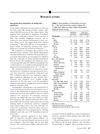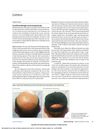 November 2024 in “Journal of Clinical Medicine”
November 2024 in “Journal of Clinical Medicine” The treatment improved hair thickness, shine, and reduced hair loss effectively.
 November 2024 in “Dermatitis”
November 2024 in “Dermatitis” Men's personal care products often cause allergic skin reactions.
 September 2024 in “Journal of Cosmetic Dermatology”
September 2024 in “Journal of Cosmetic Dermatology” Quercetin-loaded nanoparticles protect human hair from UV-B damage.
 September 2024 in “Journal of Cosmetic Dermatology”
September 2024 in “Journal of Cosmetic Dermatology” Follow these guidelines to safely and effectively use energy-based devices in aesthetic treatments.
 August 2024 in “Cosmetics”
August 2024 in “Cosmetics” Caffeine is beneficial for skin and hair treatments but needs better delivery methods to penetrate deeper skin layers.
August 2024 in “Cosmetics” Peanut callus extract helps grow hair and prevent hair loss.
April 2024 in “Journal of clinical medicine” Effective treatment guidelines for frontal fibrosing alopecia are still unclear.
 February 2024 in “Skin health and disease”
February 2024 in “Skin health and disease” Many popular skincare products claim to prevent aging but lack strong evidence to prove their effectiveness and safety.
January 2024 in “Cosmetics” Menopause worsens skin, hair, and nails, affecting self-esteem and quality of life.
November 2023 in “Cosmetics” Rice derivatives in conditioners protect and improve hair health.
 October 2023 in “Biomaterials”
October 2023 in “Biomaterials” Nanotechnology could improve hair regrowth but faces challenges like complexity and safety concerns.
October 2023 in “Biomimetics” The new hair-dyeing shampoo is safe, colors hair evenly, and strengthens it.
 July 2023 in “Photodermatology, Photoimmunology and Photomedicine”
July 2023 in “Photodermatology, Photoimmunology and Photomedicine” Infrared radiation can cause skin aging and cancer at high temperatures but may have therapeutic benefits at controlled levels.
 July 2023 in “International Journal of Cosmetic Science”
July 2023 in “International Journal of Cosmetic Science” Biopolymers are increasingly used in cosmetics for their non-toxicity and skin benefits, with future biotech advancements likely to expand their applications.

The study concluded that Frontal fibrosing alopecia can affect younger people, is often missed in men, and may be autoimmune-related.
 May 2023 in “Health science reports”
May 2023 in “Health science reports” Coloring shampoos for gray hair may cause gene mutation, reproductive issues, and skin damage, needing stricter regulation and expert consultation.
 January 2023 in “IGI Global eBooks”
January 2023 in “IGI Global eBooks” Cannabis may help with skin and hair health but could also increase heart and stroke risks.
 January 2023 in “Health science reports”
January 2023 in “Health science reports” French maritime pine bark extract significantly increased hair density in menopausal women.
 October 2020 in “International Journal of Research in Dermatology”
October 2020 in “International Journal of Research in Dermatology” The review suggests more research is needed to understand Frontal fibrosing alopecia, a condition causing hairline recession in postmenopausal women.
 January 2017 in “Journal of Investigative Dermatology Symposium Proceedings”
January 2017 in “Journal of Investigative Dermatology Symposium Proceedings” The 2015 Hair Research Congress concluded that stem cells, maraviroc, and simvastatin could potentially treat Alopecia Areata, topical minoxidil, finasteride, and steroids could treat Frontal Fibrosing Alopecia, and PTGDR2 antagonists could also treat alopecia. They also found that low-level light therapy could help with hair loss, a robotic device could assist in hair extraction, and nutrition could aid hair growth. They suggested that Alopecia Areata is an inflammatory disorder, not a single disease, indicating a need for personalized treatments.
 July 2012 in “Hair transplant forum international”
July 2012 in “Hair transplant forum international” Lifestyle choices like stress, smoking, heavy drinking, sun exposure, and chemical hair treatments might speed up hair loss in people with androgenetic alopecia.
12 citations,
March 2019 in “Cosmetics” The oral supplement with Pinus pinaster and Grape seed extract, used with sunscreen, effectively and safely improved mild-to-moderate facial melasma.
2 citations,
April 2021 in “International Journal of Cosmetic Science” The sunscreen with two antioxidants offers quick and lasting skin protection from sun damage.
 August 2018 in “Journal of The American Academy of Dermatology”
August 2018 in “Journal of The American Academy of Dermatology” The conclusion is that finasteride is linked to an increased risk of suicidal thoughts and a higher risk of completed suicide when used for hair loss.
 32 citations,
November 2018 in “Anais Brasileiros de Dermatologia”
32 citations,
November 2018 in “Anais Brasileiros de Dermatologia” In Brazil in 2018, the most common skin issues were acne, photoaging, and nonmelanoma skin cancer, with treatments often including topical medications and sunscreen.
 24 citations,
December 2011 in “Journal of The American Academy of Dermatology”
24 citations,
December 2011 in “Journal of The American Academy of Dermatology” Melanoma survivors are more likely to use sunscreen and seek shade than others, but less than half often use sunscreen and avoid the sun, and some still use tanning beds.
 19 citations,
July 2019 in “Biomedical Microdevices”
19 citations,
July 2019 in “Biomedical Microdevices” Microneedles can cause side effects like infection and allergic reactions, and precautions like test spots and sunscreen are recommended.
 10 citations,
January 2014 in “Indian Dermatology Online Journal”
10 citations,
January 2014 in “Indian Dermatology Online Journal” Most medical students in the study had skin and hair issues, with acne, hair loss, and sun tan being common, and these issues varied by gender and origin.
 5 citations,
January 2023 in “Journal of the European Academy of Dermatology and Venereology”
5 citations,
January 2023 in “Journal of the European Academy of Dermatology and Venereology” Experts advise using sunscreen and proper skin care before, during, and after procedures to speed healing, prevent complications, and reduce scarring.
 April 2016 in “JAMA Dermatology”
April 2016 in “JAMA Dermatology” Baseball caps don't fully protect bald spots on the back of the head from sun damage; wear wide-brimmed hats or use sunscreen.























